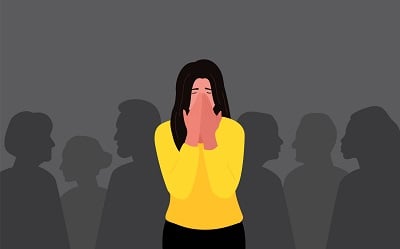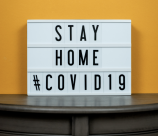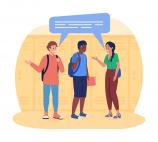Social Anxiety After Quarantine Is Normal
Social Anxiety After Quarantine Is Normal

Watch Dr. Carmichael's YouTube video
As COVID restrictions get a little less and less frigid with the ongoing vaccination campaigns, a lot of us are very excited to resume some of our normal work and social life. At the same time, we may experience a burst of anxiety as we start to get out of quarantine-- after all, it’s been a really long time, right?!
To help ease up that anxious feeling, I’ve packaged some of my favorite pointers into an easy-to-remember acronym of S.U.N. to help you cope!
S - SCAN. When you enter a room full of people, it's normal that you might suddenly feel a bit jittery-- you likely haven't navigated group social settings in a long time. To help prevent an anxious monologue from taking over your thoughts, scan for five signs of social acceptance. These signs can be anything from a friendly smile, to open body language, to a simple “hello” or even just eye contact. The simple challenge of scanning for signs of social acceptance will train your brain to focus on connection with others rather than an anxious monologue.
U - UPDATE. Many of us have an old impression of COVID from over a year ago when all of this started. We were experiencing things like not enough groceries in the grocery store, concerns about not enough ventilators, and so many other fears. The good news is that if you’re someone who is reading this article, you likely now have access to three vaccines, a medical world that has a great body of knowledge about treatment, and a supply chain that has been largely normalized! We're in a new situation, and we need to mentally update our image of what COVID is because many of us are still mentally and emotionally responding to it the same way we did a year ago when we locked ourselves up in the house. We need to consciously update ourselves that it's a new day.
N - NORMALIZE. that some anxiety is okay. The healthy function of anxiety is to stimulate preparation behaviors, and a certain amount of it just means that we care about what's going on around us. So try not to think about having anxiety as automatically being a bad thing, but rather as something that can help prepare and protect you, if you know how to use it properly. For example, a person with zero anxiety might not think ahead to prepare for the (almost inevitable) social anxiety that could arise after a long time in isolation. So don’t let mild anxiety snowball and turn into “anxiety about anxiety”. Recognize that a certain level of anxiety is to be expected, and will likely decrease over time as you start resuming your normal habits.
Conclusion
I hope the S.U.N. system is helpful to you! Other helpful tips would include trying some deep breathing, inviting a buddy to accompany you on your first outing (or three!) and of course to always know that therapists or coaches are available if you feel the need for more individual support. Sometimes when a traumatic situation starts coming to a close, we suddenly need to go back and revisit feelings from the start of said traumatic event. It’s quite common to find yourself needing extra rest or downtime to process the closure of any major life event, and a year-plus of lockdown definitely counts. For more ideas on healthy ways to use anxiety in a constructive way, check out my book, Nervous Energy: Harness the Power of Your Anxiety.




















